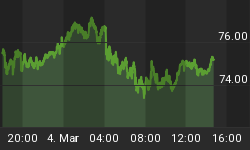Indians who sold their gold in 2007 to buy stocks are now paying out the wazoo for their gross misjudgment. In January of 2008, the Bombay Stock Exchange fell by more than 4,000 points. It is now a full 8,000 points short of its January 8th peak,

while gold is $70 higher than it was then.

Ironically, on January 17th, the article Indians Sell Gold - and their Future was published. The following day, the Bombay Stock Exchange (BSE) lived up to its name and bombed from 21,000 all the way down to 17,000.
The BSE has never recovered.
It most recently has desperately tried to cling to the 14,000-level in hopes of avoiding further drops down to 9,000 and below - and failed, only to slip down to 13,000. That's the same level where it was in November of 2006, twenty months ago. At that time, gold stood at around $470. Now, gold costs nearly twice as much.
Most of the gains the Indian stockists enjoyed since then are now little more than vapors in their memory. All of the gains of gold since then are still there. Maybe diversifying into some stocks in addition to gold would have made better sense - but selling gold for regular stocks?
Ouch!
They should have known better.
Accompanying the BSE on it trip down south are the hopes of Indian retail investors who hoped to get rich off the BSE's until then prodigious rise. Riding along in the passenger seat on that trip are the yearnings of Indian jewelers and traditional gold buyers for lower gold prices.
What's the lesson? It pays big bucks to ignore the siren song of the paper-pushers: "Come, my poor peasant friend. Sell your clumsy gold and open a brand-new bank account with us. Then, you can buy and sell Indian stocks through our in-house brokerage service and support your country's powerful economy."
Now, the gold is gone, and so is much of the money they sunk into their paper stocks. What will Indians do? Will they return to gold?
In June, Indian gold buying dropped to a third of what Indians bought during June a year ago. They are still waiting for lower prices. Doesn't seem to be happening. Lower than now, maybe - but lower than the $650/oz. in June of 2007? Forget it!
The Future
What willl the future bring? Will the BSE recover its erstwhile glory? Will it return to outshine gold?
The BSE's blue 50-day moving average has fallen way below the red 200-day MA, and its descent is accelerating. Gold, on the other hand, has never touched its own 200-DMA, and its 50-DMA rests securely above its longer term colleague and has recently turned north again.
So, will Indians return to their traditional gold buying habits, then?
, it doesn't look that way. The stock market has further ground to lose, so those unsophisticated enough to hang on in hopes for better times will be hurt even more. Those who sell now or who recently sold their stock positions are already hurting. The rupee is weak and looks ready to fall further against the dollar, so that will make higher gold prices doubly unpalatable to them.
Quite possibly, it will take massive across-the-board price inflation to steer Indians back to the gold market, like the 25% inflation figures in Vietnam, for example. Vietnamese have been the largest gold importers in Q1 of this year - and that's in absolute terms, not per capita!
What do the Vietnamese know that Indians don't - or forgot?
However expensive Indians may perceive gold to be right now, it would be wise for them to put whatever disposable income, cash (and stock) assets they have back into gold. The rupee's fall makes holding cash unattractive. Equities are falling and so are Indian treasuries due to high inflation expectations.
Gold and silver will be some of the few things worth sinking money into - regardless of price - because the price of leaving their money in falling assets is obviously even higher. It only gets more and more expensive as time moves on.
Gold is rising even without India's traditional buying levels of approximately three times what they are now. The Indian gold train is moving and pulling out of the station. The more speed it gathers, the harder it will be to jump back on.
Hesitating any longer will be more expensive than gold could ever hope to be. In fact, logic would dictate that the more expensive gold gets, the more it will cost those who decide to wait before they buy it - in terms of lost profits. The same thing goes for all investors, of course, not only Indians.
Got gold?















